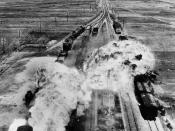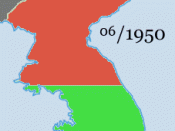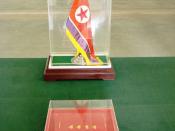The Korean War was one of the bloodiest wars in the history. After World War II, in order to maintain political prestige among the uncommitted nations of world, neither side could allow any advantages or concession. The Soviets tried to blockade Berlin, but still could not prevent from the war, and which led to the creation of the Korean War.
The Korean War started on June 25, 1950. The war began between 'Democratic People's Republic of Korea' and South Korea and it had strongly affected the Cold War betwen the US, USSR and China. It also harshly strengthened the intensions between them.
The war lasted for three years from June 25 1950. North Korea had a communist system and the south was capitalist. In World War Two, both USSR and USA helped defeat the Japanese in Korea, which eventually divided Korea into two parts. One with the communist system (North) from USSR, and capitalists (South) from the USA.
The line that divided them was the 38th parallel. It began with North Korean soldiers crossing the 38th parallel after the Secretary of State (Dean Acheson) outlined a perimeter, which South Korea wasn't included, therefore the north Korean leader Kim Il Song decided to 'unite' Korea. When they almost accomplished the mission, UN army (mainly US army) backed south up from July. It resulted China to join the war when UN army (US army and MacArthur 'rolled back' to the border to China on River Yalu. Finally, this war lasted for 3 years, more than a million people were killed all together, and the armistice was signed in the 38th parallel again. Both North and South Korea had no geographical change, but money, industries, populations were gone, also effected on the Cold.
As a result of the Korean War, nearly...


